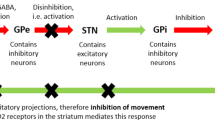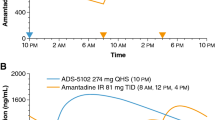Abstract.
Huntington's disease (HD) is characterized by chorea, cognitive and behavioral changes. Amantadine, a non-competitive NMDA receptor antagonist, has shown an antidyskinetic effect on levodopa-induced dyskinesias, which are known to have strict pathogenetic analogies with choreic hyperkinesias. The antidyskinetic efficacy of amantadine and its effects on cognitive and behavioural symptoms were evaluated. Eight HD patients received oral amantadine (100 mg tid) unblinded for a 1-year period. A significant reduction of dyskinesias was reported (p<0.01). No changes were observed in neuropsychologic and psychiatric assessments after 6 and 12 months of therapy. These data may have relevance to the treatment of HD with amantadine.
Similar content being viewed by others
Author information
Authors and Affiliations
Additional information
Correspondence to U. Bonuccelli
Rights and permissions
About this article
Cite this article
Lucetti, C., Gambaccini, G., Bernardini, S. et al. Amantadine in Huntington's disease: open-label video-blinded study. Neurol Sci 23 (Suppl 2), s83–s84 (2002). https://doi.org/10.1007/s100720200081
Issue Date:
DOI: https://doi.org/10.1007/s100720200081




